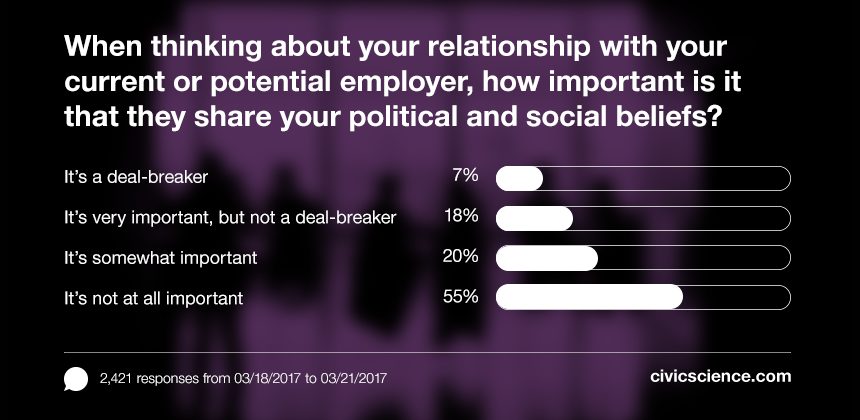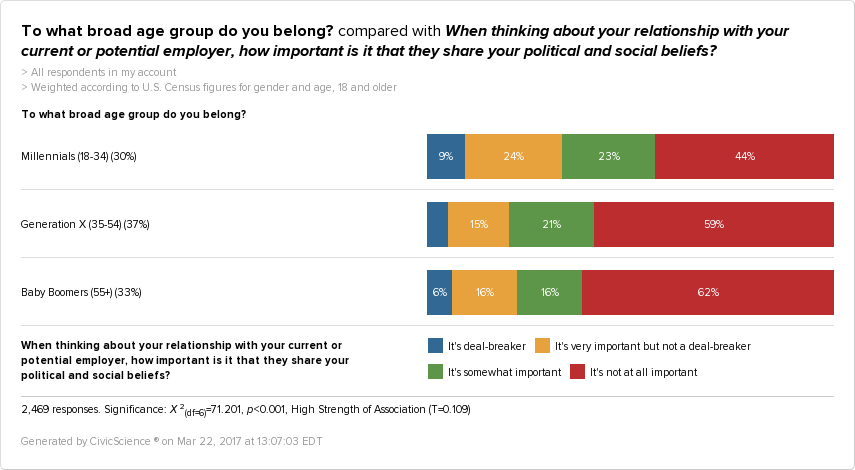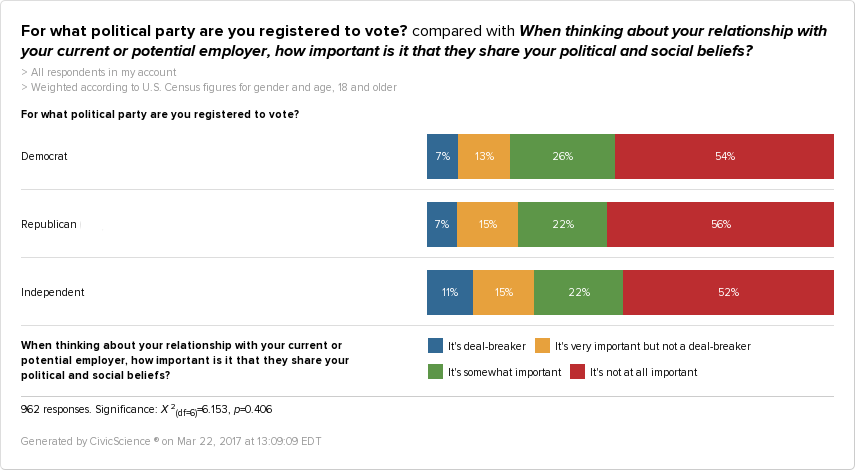SUMMARY: Companies need to consider the internal consequences of corporate activism in addition to external effects, though to a lesser degree. Although 45% of U.S. adults consider it at least somewhat important that their current or potential employers share their political and social views, only 6% of adults consider this a deal-breaker. In this post, we take a look at those politically-minded employees, and what they mean for companies who are hoping to bring in or retain today’s top talent.
Recently, we’ve done a ton of research surrounding companies and politics. In today’s increasingly-divisive political climate (side note: how many times have you heard that phrase recently?), everything from shopping behavior to unfriending frenzies can be attributed, in large part, to political beliefs. In addition, Millennials and other groups have taken an increasing interest in politics. With all of this in mind, it should come as no surprise that companies need to be aware of how their decisions to take political and social stances may help or hinder business.
However, much of the existing discourse surrounding brands and politics has centered around external relations, i.e. “what will my customers think if I tweet _____ at Donald Trump, or if I decide to drop the Trump brand?” The importance of those questions cannot be overstated, but we were also curious about the internal effects of such political stances and shows of corporate activism. What we mean is, how do these stances affect the employer/employee relationship?
Does corporate activism bring in top prospects? Do these stances just risk isolating existing employees? The list of unanswered questions and concerns could go on and on.
To begin delving into yet another facet of companies and American politics, take a look at these topline results:
Only 7% of adults say that their current or potential employer sharing (or not sharing) their political and social beliefs is a deal-breaker. For comparison, when asked the exact same question about current or potential spouses, instead of companies, we found that number to be 18%.
The simple insight may be this: although Americans are more entrenched in politics in their personal lives and throughout their consumer decisions, those beliefs may not (yet) transfer to the workplace. But that’s not the whole story.
How do these politically-minded, issue-driven employees differ by age and political affiliation, and what else do we know about them?
AGE
We find this fascinating. More Millennials (56%) than not (44%) consider their companies’ social and political stances at least somewhat important. The same statement does not hold true for any other adult generation. In addition, it’s common knowledge that Millennials tend to lean to the political left.
This is something companies will want to consider if they hope to bring on the best and brightest young talent. Incentives, extended PTO and free beer may not cut it for the younger generation, who expect that the companies they do business with, and work for, will share their political and social beliefs.
POLITICAL AFFILIATION
Here is what we find when focusing solely on Democrats, Republicans, and Independents:
Independents are most likely to care about their employers’ political and social beliefs – humbly followed by Democrats. The major point, it seems, is that roughly 50% of adults in each of these political buckets are likely to consider their employers’ political and social stances at least somewhat important.
To be more concise, this issue is one that all companies should care about, regardless of their political leanings.
WHO ARE COMPANIES AT RISK OF LOSING?
Although there are relatively few who say that their company’s political and social stances are deal-breakers, we did find some interesting traits about them.
They are significantly less likely to say they can usually see how both sides of an argument could be right or wrong. In terms of projects, they are more likely to say that they prefer to start projects, as opposed to preferring to finish them.
For breaking news, they’re more likely to go to a national network news channel first (18% of the time), closely followed by social media (13% of the time). Next, 18% of them have an undergraduate degree in STEM, 15% of them have an undergraduate degree in business, and 14% of them have an undergraduate degree in the arts and/or humanities.
WHEN LACK OF STANCE IS A STANCE ITSELF
One question to consider, given this data, is what constitutes a “stance.” To the politically-minded, a stance might be what others consider a lack of stance. Staying silent about a certain policy might be as loud as issuing a public comment.
In fact, a recent Forbes article shows that remaining silent may be more detrimental to companies than many think, and let’s be honest, this sucks for companies.
If you take a vocal stance, you risk alienating customers, and alienating current or potential talented employees. If you lack taking a vocal stance, you might do the same. This isn’t new, but it’s not a stretch to say that this trend is more visible now, due to blazing tension around the country, and again, due to consumer expectations that the companies they interact with will share their political beliefs.
WHAT DOES THIS MEAN FOR TODAY’S COMPANIES?
In short, companies need to consider the internal consequences of social stances in addition to external ones. 45% of U.S. adults consider it at least somewhat important that their current or potential employers’ share their political and social views. That percentage is much lower than those who consider it at least somewhat important that their spouses, for example, share their political views.
Regardless, it’s not a number to take lightly. Although it seems that U.S. adults are still compartmentalizing their political beliefs from their workplaces, there is no guarantee it will stay that way, especially when considering the rapid political changes in our midst.











